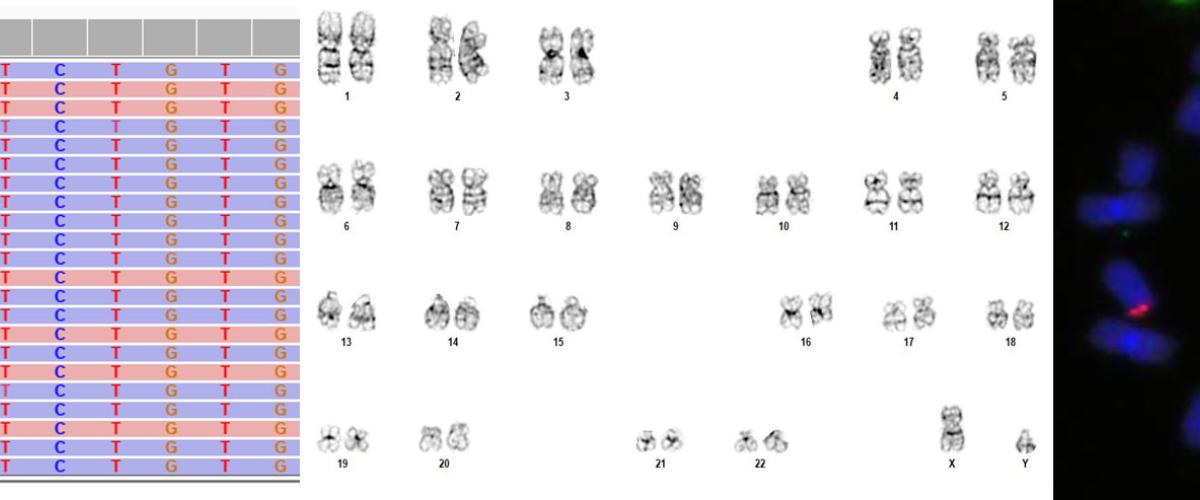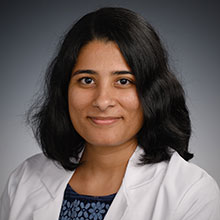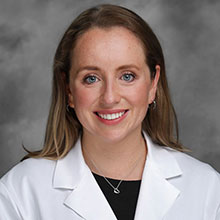
The Duke Laboratory Genetics and Genomics (LGG) Fellowship Program provides postdoctoral fellows with either a PhD or MD with training experience in the Duke Cytogenetics and Duke Molecular Diagnostics Laboratories. The two laboratories share a common laboratory space on the main campus of Duke Hospital, with faculty leadership boarded by the ABMGG in both cytogenetics and molecular genetics. In order to fully integrate the testing of both laboratories, the fellowship is split into focus blocks of constitutional/germline testing, hematologic malignancy testing, and solid tumor testing during which the intent is to learn how both cytogenetic and molecular techniques are employed to answer clinical questions. The LGG fellows will gain experience in a wide range of laboratory techniques, including:
- Chromosome analysis (prenatal, postnatal, bone marrow)
- FISH (constitutional, hematologic malignancy, solid tumor)
- Microarray analysis
- NGS and Sanger sequencing (hematologic malignancy, solid tumor, and constitutional)
- Methylation assays (PWS/AS, MLH1 promoter)
- Carrier screening (cystic fibrosis, hemochromatosis, SMA, Fragile X, etc.)
- qPCR (BCR/ABL1 quantification, somatic mutation detection)
- Somatic mutations and aberrations (MSI, T– and B–cell clonality, IGH somatic mutation, etc.)
- Bone marrow engraftment analysis via STR profiling
The laboratory trainees will also perform rotations within various medical genetics clinics (e.g. general medical genetics clinic, Down syndrome clinic, exome clinic, metabolic clinic), as well as prenatal and hereditary cancer clinics. LGG trainees will also rotate in the Duke Biochemical Genetics laboratory. There are opportunities to visit other Duke laboratories such as flow cytometry, microbiology, and image cytometry. The majority of the trainee’s time will be spent in the integrated Duke Cytogenetics and Molecular Diagnostics Laboratories.
In addition to gaining experience in the fields of cytogenetics and molecular genetics, fellows will participate in new test development and validation, as well as the ongoing quality improvement initiatives. Fellows will also gain experience in the laboratory inspection process, and are expected to become familiar with the requirements of regulatory and licensing agencies such as CAP and CLIA. Laboratory fellows may also attend national conferences and participate in clinical research.
Program Overview
Positions offered per year: One
Current number of fellows: Two
Program duration: Two years
Accrediting body: Accreditation Council for Graduate Medical Education (ACGME)
How to Apply
We anticipate one fellowship position opening per year. We encourage you to apply during the application window.
To apply, please submit your CV, personal statement, and three letters of recommendation to Program Director Kristen Deak.
Applications should be submitted between July and September of the prior year to the desired start date. Individuals typically begin their fellowship on July 1st.
Application is open to all eligible members of the community without regard to, or based on, any protected characteristic as defined by Duke policy.
Stipends are commensurate with the year of postgraduate training.
Additional links pertaining to LGG certification through the ABMGG: ABMGG Degree/Training Requirements
Contacts

Brittany Harris
Program Coordinator
Department of Pathology
Duke University Medical Center
Email
Current Fellows

Shruthi Mohan, Phd
Laboratory Genetic and Genomics Fellowship
Sri Ramachandra University
shruthi.mohan@duke.edu

Laboratory Genetics and Genomics
Duke University - University Program in Genetics and Genomics PhD



